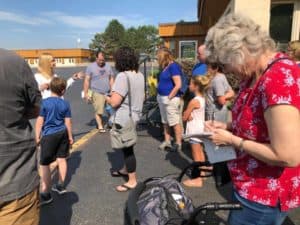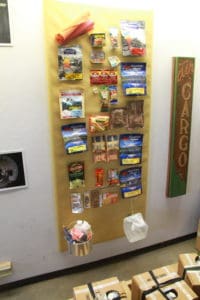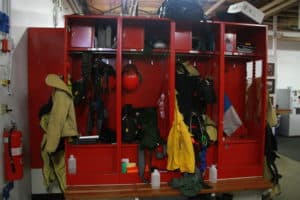One of the most challenging parts of being a novelist is writing authentically and with detail on topics about which I know nothing. It’s like being a newspaper reporter again. Which means doing my research. Readers rightly expect writers to create a fictional world based on accurate details. So I do my best and learn new things along the way. A case in point is my new Amish of Sky Country series. The first book, Mountains of Grace, which debuts Aug. 6, features a smoke jumper, a sheriff’s deputy, two Amish people, their English friend, and the raging 2017 Caribou wildfire in Northwestern Montana.
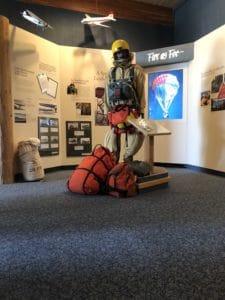
To learn more about how smoke jumpers, the U.S. Forest Service, and local law enforcement work together to fight wildfires, as well as the Amish communities in Montana, my husband and I traveled to the state last summer, with stops at the Smoke Jumpers School outside Missoula, Libby, Rexford, West Kootenai, Kalispell, Pablo People’s Center, St. Ignatius, and a pow-wow in Arlee.
After the tour, the guide was kind enough to ask Operations Foreman and experienced smoke jumper Dan Cottrell to share with me the life of a smoke jumper. That interview gave me all the rich detail I needed for my fictional smoke jumper Spencer McDonald in Mountains of Grace.
First fact I learned: Smoke jumpers aren’t crazy to jump out of planes into the path of raging wildfires. They’re highly trained, experienced firefighters who went one enormous step farther by training to become smoke jumpers.
Cottrell explained he knew early in his career that he wanted to do this because he was intrigued by the idea of working with aircraft and he liked working with little supervision. “Smoke jumpers have to be very independent, and self-sufficient,” he explained. “Smoker jumpers are free thinkers. Jumping requires the firefighter to be creative and a problem solver. He has to think outside the box.”
He (or she, there are five female smoke jumpers currently at the Missoula base) have to work in remote places with little or no support. “We’re still a team,” Cottrell points out. “We’re self-sufficient as a group and we don’t need a lot of support.”
What they do need is training. They must have at least two years of firefighting experience to apply to the school. Cottrell worked eight fire seasons on land crews and as a helicopter rappeller before applying. It took three tries to get accepted. There is a 30 percent washout rate. Six weeks of training includes 90 minutes of physical training each day, learning to pack chutes, repair chutes, in-class training, and 25 practice jumps. They also must be able to run 1.5 miles in under 11 minutes.

For their efforts, the starting pay is $16 an hour with 25 percent hazard pay on jumps and 75 percent overtime.
During the off season those who were hired in May as seasonal workers are laid off in September or October. Many work as EMTs during the off-season.
Not a glamorous job by any means. When a fire call comes, they have two minutes to get their fire resistant Kevlar suits on. They do safety checks and get on the plane in under 10 minutes. They carry two parachutes, a fire shelter, and their tools.
They may be on the the ground 3 to 5 days. In extreme cases, up to 21 days. Supplies, water, and tools are dropped from the plane, but must what remains be carried out on their backs.
What do they eat while on the ground? According to the tour guide, they love their spam. They come up with creative ways to use it: sushi spam, spam tamales, and spam tempora for example. They also have peanuts, oatmeal, MREs, coffee, dried fruits, and protein bars.
On the ground, the firefighters with chainsaws go first and get a head-start by creating a clear space free of trees and logs. The firefifhters with tools make a hand line and clear trees above ground. Diggers with hand tools remove grass and ground until it is devoid of fuels. Once the containment line is in place, they head toward the interior where they mix hot stuff with cold stubble. They grub with hand tools, mixing cool earth with embers. If there’s water they try to use that to speed things up. It’s laborious, hot, backbreaking work.
Smoke jumpers are more concerned with jump hazards than fire dangers
Cottrell has been jumping for 18 years. Does he ever get scared or nervous? “My biggest concern is getting on the ground safely. You have a heightened sense of awareness and concern,” he said. “Super super focused on getting on the ground safely. Once I’m on the ground I’m confident I’ll have a safe outcome.”
The reason for the concern is that many factors are beyond the
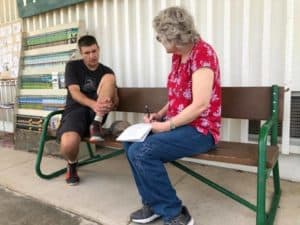
jumper’s control, Cottrell explained. “It looks great from the air, nice grassy meadow, but you can’t see the logs, rocks and other items in the field that can cause injury. You can’t control gusts of wind that may take you into the trees.”
Once he’s on the ground, he’s not concerned because he’s working with experienced firefighters. Most have at least ten seasons but some have more than 30. “If there is a high risk we don’t engage. If we see an issue, we say better 5,000 acres burn than someone gets hurt. We’re not going to get into it when there are lives on the line.”
Back on the home front, spouses may worry some, but the bigger issue is the inability to plan and often becoming a single parent while a smoke jumper is away fighting a fire. “We can’t make plans in the summer time. It’s more logistical than the wife worrying. If we bought concert tickets, guess what we can’t go. We’re usually working July 4, Memorial Day and Labor Day. They’re single parenting. On the flip side, I took my kid to the bus every morning October through April. I went to work late and left early. We have time off in the winter months.”
As exciting as smoke jumping may sound there isn’t a rush of applicants for the job, Cottrell said. There has been a decline in funding. Some jumpers have been seasonal for as long as eight years and aren’t eligible for benefits. “We have a hard time getting people interested because the pay is low and the risk is high.”
All these details became fodder for my Mountains of Grace smoke jumper Spencer McDonald. It would be impossible to tell his story without the insights Dan Cottrell shared with me.
Here’s a sneak peek excerpt from Chapter One of Mountains of Grace featuring Spencer:
Waddle, waddle, waddle. Grinning behind his face mask’s metal mesh, Spencer McDonald hoisted himself into the Shorts C-23 Sherpa aircraft and squeezed into a seat on the bench next to his buddy Dan Martinez. People laboring under the illusion that smoke jumping was a glamorous job should spend some time crammed into these tan Kevlar jumpsuits donned over a uniform made of fire resistant Nomex, helmets, parachute pack on the back, another reserve parachute strapped to the front, a personal gear bag with first-aid kit and fire shelter on the hip. They would understand what it felt like to be a guy in an oversized snowsuit in the middle of a sizzling-hot August day. Or an ear of corn wrapped in foil on a gas grill. Pop, pop, pop.
“What are you grinning about?” The suit took the bulk of Dan’s elbow jabbing his ribs. “It’s not funny. So much for taking the kiddos camping for Labor Day weekend,” Dan yelled over the plane’s noisy engine. “Sheila hates to camp without me.”
“She can’t be surprised.” The wildfire season ran May through September. Which meant smoke jumpers rarely spent Memorial Day, July Fourth, or Labor Day holidays with their families. It didn’t matter to Spencer. In fact, he preferred working the holidays. “You’ll make it up to them when you walk them to school in October.”
Dan offered a thumbs-up. By now ten smoke jumpers and two spotters in green jumpsuits crowded the bench. The plane taxied and took off, increasing the noise, wind, and heat factors by 500 percent.
The plane headed northwest from the Missoula Fire Base to the Kootenai National Forest near Eureka.
Eureka. Spencer’s hometown. He shook off the thought with such force it spun out of the plane and into outer space.
The incident commander rolled out the map. The full-volume chatter ended. The fire, sparked by lightning on August ninth, hadn’t been spotted by a U.S. Forest Service observation plane until three days later. Efforts by local crews on the ground to contain the fire had been unsuccessful. A U.S. Forest Service Type 2 Incident Command Team would take over containment efforts next.
“The weather conditions are extreme.” The commander’s deep bass was perfect for briefing in these noisy conditions. “No rain in thirty days, high temperatures, and gusty winds. No rain in the forecast. The fire has shifted to the southeast. Populations in an area called West Kootenai are under pre-evacuation orders.”
West Kootenai. Spencer hadn’t thought of the folks in that backwater town in years. Amish families mixed in with English families who enjoyed living in one of the few pockets of earth almost untouched by civilization. Hardworking people who also enjoyed the spectacular vistas, hunting, fishing, and boating in the beautiful Purcell, Cabinet, and Salish Mountains.
Now threatened by an adversary that consumed everything in its indiscriminate path.
The spotter talked on his headset. He and his cohort conversed. Radio frequencies, flight restrictions, water sources, safe zones—everything got covered, preparing the way for a safe, effective, efficient jump just outside a raging wildfire that often couldn’t be second-guessed.
The plane’s engine throttled back to drop speed. The pilot began to circle the drop spot.
“We’re getting close.” The spotter picked up weighted crepe streamers that would be used to check the wind and the speed of the drop at the proposed jump spot. “Get ready.”
They were ready. Intensive PT that included running 1.5 miles in under eleven minutes—Spencer ran it in under eight without breaking a sweat—gave them the physical endurance needed to dig out ground cover down to the mineral level and remove fire fuel in strips a football field wide. Mentally, their heads were in the game the second the horn sounded at the base, giving them ten minutes to suit up, safety check, and sprint to the plane.
Spencer checked out the terrain below through the open door on the side of the plane. Black smoke and fierce red flames billowed along the end of a small meadow. Deer and elk bounded through open spaces. Towering pines in the fire zone ringed the opening. Beyond it a skinny ribbon of hunter’s path would serve as egress when they had to pack out all their equipment on their backs.
The streamers fluttered in the wind and sank to the ground.
Forty fire jumps and many more practice jumps under his belt, Spencer still didn’t take any of this for granted. Too many variables beyond his control. Things looked different from the sky than on the ground. Hidden obstacles, rocks, stumps, logs. Gusts of wind. It didn’t matter. He lived for this. It had taken three tries to get accepted to the Missoula Smoke Jumper’s School after three seasons as a helicopter rappeller in Idaho.
Rappelling into a fire zone produced an exhilarating adrenaline high that lasted for hours. Jumping into that zone was even more fun, but riskier.
Once he hit the ground Spencer had no qualms. He worked with some of the most experienced firefighters in the country. After four years on the job, he was still considered one of the new guys. Only rookie Chase Wilson had less experience. Chase was about to jump for the first time with a chute he’d rigged himself. Twenty-one was the magic number that made him certified to pack the chutes.
Chase’s left foot, clad in a heavy-duty steel-toed boot, tapped wildly. His entire leg jiggled. Spencer leaned over Dan and tapped the guy’s knee with a gloved hand. “You ready to make those Spam tacos down there?”
Chase’s leg quieted. “I’ve been working on a recipe for Spam sushi I think you’re gonna like.”
Spam was gourmet food at its finest on the fire line.
“What does your wife think of your cooking?”
“She’d rather I stick to barbecuing hamburgers.” Grinning, Chase relaxed against the bench. “She’s very picky about smells these days.”
The young newlyweds were expecting their first baby—a boy already named Chase Junior. “When this is over, take her home some ice cream.” Not that Spencer knew much about pregnant woman. Only what he’d heard long distance from his sister. “My sis says it has medicinal effects.”
“Got it.” Chase twisted the silver band on his ring finger. “She’s in to Rocky Road.”
“Good luck out there, buddy.”
Chase shrugged. “Right back at ’cha.”
The noise of the engine ratcheted back. The plane began its orbit around the jump spot.
“Get ready.” The spotter gave the thumbs-up to Spencer. “No catching a catnap on the way down.”
No chance of that.
“Leg straps tight?”
Affirmative.
“Hook up.”
Spencer hooked up. He put one hand on the door frame and the other one on his reserve chute.
The plane turned.
“Static line is clear.”
The spotter smacked his back. Spencer grabbed the outside of the frame with both hands, stepped out, and embraced the free fall. His static line would open his parachute automatically. If it didn’t he had the backup on his chest. Eighty-five seconds and counting.
The chute opened. The noise ceased. The sky became the most peaceful place on earth.

